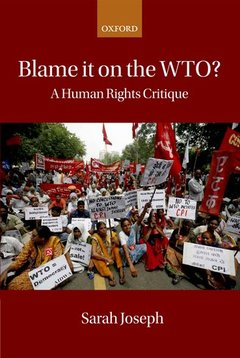Blame it on the WTO? A Human Rights Critique
Langue : Anglais
Auteur : Joseph Sarah

This is an open access title available under the terms of a CC BY-NC-ND 3.0 International licence. It is free to read at Oxford Scholarship Online and offered as a free PDF download from OUP and selected open access locations. The World Trade Organization (WTO) is often accused of, at best, not paying enough attention to human rights or, at worst, facilitating and perpetuating human rights abuses. This book weighs these criticisms and examines their validity, incorporating legal arguments as well as some economic and political science perspectives. After introducing the respective WTO and human rights regimes, and discussing their legal and normative relationship to each other, the book presents a detailed analysis of the main human rights concerns relating to the WTO. These include the alleged democratic deficit within the Organization and the impact of WTO rules on the right to health, labour rights, the right to food, and on questions of poverty and development. Given that some of the most important issues within the WTO concern its impact on poor people within developing States, the book asks whether rich States have an obligation to the people of poorer States to construct a fairer trading system that better facilitates the alleviation of poverty and development. Against this background, the book examines the current Doha round proposals as well as suggestions for reform of the WTO to make it more 'human rights-friendly'.
Introduction. 1. Introducing the WTO and International Human Rights Regimes. 2. The Relationship between the WTO and International Human Rights Law. 3. The Democratic Deficit and the WTO. 4. 'Human Rights' Restrictions on Trade. 5. The WTO, Poverty, and Development. 6. The WTO and the Right to Food. 7. TRIPS and the Right to Health. 8. The Doha Round and Other Free Trade Initiatives. 9. Extraterritorial Duties Owed by Rich States to the People of Poor States. 10. Proposals for Reform and Conclusion.
Sarah Joseph is a Professor of Human Rights Law, and the Director of the Castan Centre for Human Rights Law at Monash University in Melbourne. She has numerous publications on human rights, in areas such as the International Covenant on Civil and Political Rights, corporations and human rights, terrorism and human rights, self-determination, and now global trade and human rights. She is also an expert on Australian constitutional law, having co-written a leading text on that issue. She has taught human rights in many settings, both international and local, for over 15 years.
Date de parution : 04-2011
Ouvrage de 362 p.
16.3x24 cm
© 2024 LAVOISIER S.A.S.



